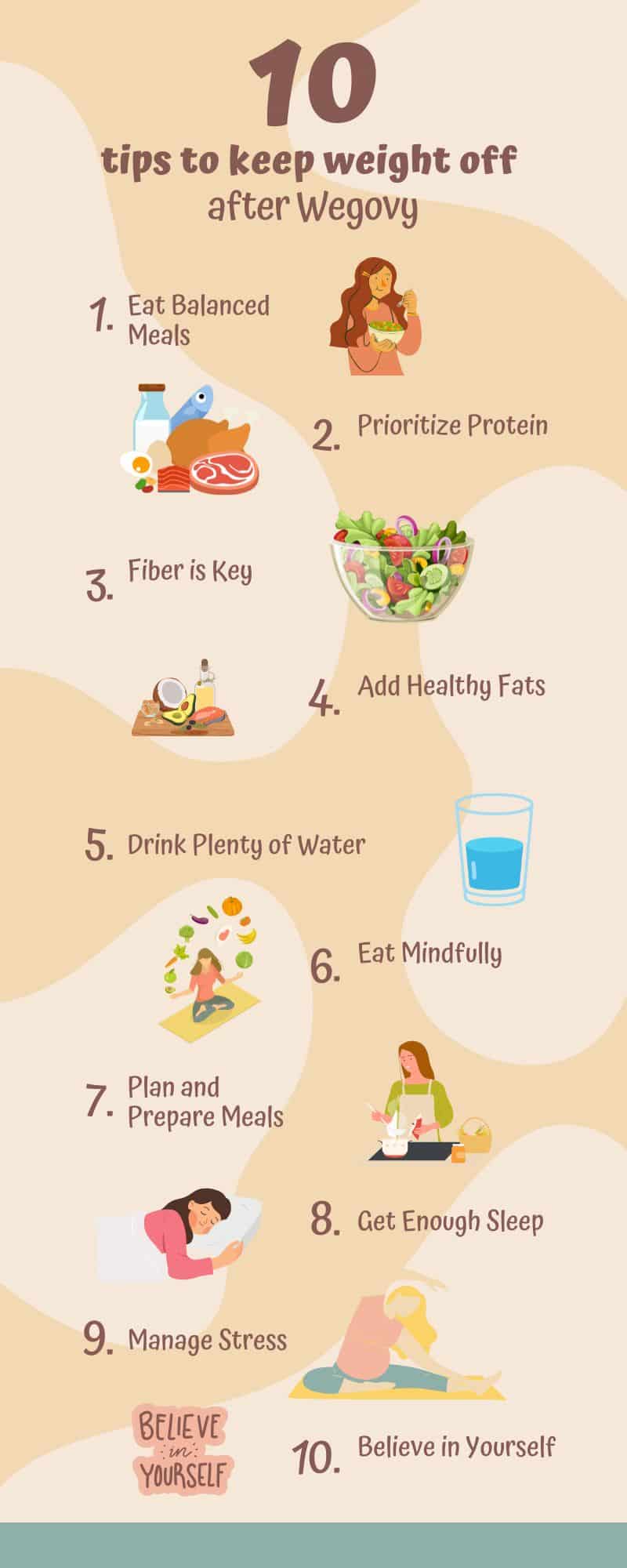Keeping the Weight Off After Wegovy: 10 Tips That Work
If you’ve recently used Wegovy to help manage your weight, congratulations on taking the first step towards a healthier you!
Table of Contents
ToggleYou’re probably aware, though, that the journey doesn’t end there.
Wegovy is a prescription medication that has been shown to be effective in helping people lose weight. But it’s important to remember that Wegovy is not a magic bullet.
Clinical trials have shown that once Wegovy is stopped, patients tend to regain some of the weight they lost. The way to prevent this from happening is to adopt healthy lifestyle habits that help you keep the pounds off for good.
What Makes Wegovy So Effective for Weight Management?
Wegovy is a GLP-1 receptor agonist, which means that it works by mimicking the action of a hormone called glucagon-like peptide-1 (GLP-1). GLP-1 is a hormone that is released after eating, and it helps to regulate appetite and food intake.
Wegovy works by binding to GLP-1 receptors in the brain and gut. This binding causes a number of effects that can help with weight loss, including:

- Reducing appetite
- Increasing feelings of fullness
- Slowing down the emptying of the stomach
Wegovy has been shown to be effective in helping people lose weight, even those who have not been successful with other weight-loss methods. In clinical trials, people who took Wegovy lost an average of 12.4% of their body weight. Wegovy is also safe and well-tolerated, with the most common side effects being nausea, vomiting, and diarrhea.
What Happens Once You Stop Taking This Medication?
When you stop taking Wegovy, your appetite will increase. This means that you could find yourself eating more than what is healthy for you. The risk of regaining all the weight you lost increases with each additional pound gained.
This is because Wegovy works by depressing your appetite, and when the medication is no longer in your system, you will return to the level of appetite that was typical before starting on the drug.
A clinical study involving 1051 participants has yielded valuable insights. The study lasted 68 weeks, but at week 20, the participants were divided into two groups. Some continued with the medication and the other group of participants stopped.
Those who stopped taking the drug at week 20 experienced gradual weight gain, while those who continued taking the drug lost 17.4% of their initial body weight.
Keeping Weight off After Wegovy

Losing weight is an incredible achievement. So, congratulations on taking the first step towards a healthier you! But you should know that keeping the weight off can be hard.
As we have seen above, Wegovy works by decreasing hunger and slowing down the stomach emptying (keeping you fuller for longer). So, it makes sense to use natural ways to mimic this action.
By adopting a few strategies and making mindful choices, you can effectively manage hunger and keep the weight off. Here are some tips to help you manage hunger effectively:
Eat Balanced Meals

Opt for meals that include a combination of lean protein, fiber-rich carbohydrates, and healthy fats.
These nutrients take longer to digest, keeping you fuller for longer. Include foods like lean meats, whole grains, fruit, vegetables, nuts, and seeds in your meals to provide sustained energy and promote satiety.
Prioritize Protein
Protein is known to be the most satiating macronutrient. So including adequate protein in your meals and snacks can help reduce hunger cravings.

Good sources of protein include poultry, fish, eggs, tofu, legumes, and Greek yogurt. Aim to incorporate protein into each meal to help you feel satisfied for longer periods.
Fiber is Key

High-fiber foods add bulk to your meals, promoting feelings of fullness. Incorporate whole grains, fruit, vegetables, and legumes into your diet to increase your fiber intake.
Not only will this help manage hunger, but fiber also supports healthy digestion and overall well-being.
Add Healthy Fats
Healthy fats are essential for weight management. Fat helps keep you full and satisfied between meals, reducing food cravings. Good sources of healthy fat include nuts, seeds, olive oil, avocados, and fatty fish like salmon.

Drink Plenty of Water

Dehydration can sometimes be mistaken for hunger. Stay hydrated by drinking plenty of water throughout the day.
Make it a habit to have a glass of water before each meal to help fill your stomach and potentially reduce your appetite.
Eat Mindfully
Slow down and pay attention to your eating experience. Chew your food thoroughly and savor each bite.
Eating mindfully allows your brain to register feelings of fullness, preventing you from overeating.
Avoid distractions, such as television or mobile devices, while eating, as these can lead to mindless overconsumption.
Plan and Prepare Meals

Planning your meals in advance can help you make healthier choices and manage portion sizes.
Prepare balanced meals and snacks ahead of time to avoid impulsive and unhealthy food choices when hunger strikes. Having nutritious options readily available will prevent you from reaching for convenient but less satisfying options.
Get Enough Sleep
Sleep plays a crucial role in hunger management. Lack of sleep can disrupt the hormones that regulate hunger and fullness, leading to increased appetite.
Aim for seven to eight hours of quality sleep each night to support your overall well-being and help manage your hunger levels.

Manage Stress

Emotional or stress-related eating can contribute to feelings of hunger even when your body doesn’t require additional food.
Find healthy ways to manage stress, such as practicing mindfulness, engaging in regular physical activity, or pursuing hobbies that bring you joy. By addressing stress effectively, you can reduce the likelihood of turning to food for comfort.
Remember, managing hunger is a personalized process. Listen to your body’s cues, adjust your portion sizes as needed, and make choices that support your overall health and well-being. By implementing these strategies, you can successfully manage hunger and maintain a healthy weight over the long-term.
Believe in Yourself
Long-term success starts with believing in yourself and your ability to make and maintain sustainable lifestyle changes.
Research has shown that self-efficacy, or “believing in yourself” is associated with successful weight management. So, be sure to remind yourself of your success and your ability to keep the weight off.
My Expert Opinion
The best time to start working on maintaining your weight after stopping Wegovy is when you first start taking the drug. It’s much easier to keep the weight off if you already have good habits in place.
I often tell my patients that weight loss drugs are only a tool to help them make the changes needed to achieve their desired weight.
Managing hunger and appetite is the key to keeping weight loss after Wegovy, and that process will differ from person to person. Listen to your body’s fullness cues, adjust your portion sizes, and make choices that support your overall health and well-being.
By implementing these strategies, you can successfully manage hunger and maintain a healthy weight over the long-term after you stop taking Wegovy.


Dr. Su-Nui Escobar, a Registered Dietitian/Nutritionist in Miami, FL, is dedicated to empowering women in perimenopause and menopause to live healthier, more satisfying lives.
With a doctorate in clinical nutrition from the University of North Florida, she has expertise in menopause and weight loss, including the unique challenges faced by those on weight loss medications.
Su-Nui’s passion for her field is evident in her previous role as the Academy of Nutrition and Dietetics spokesperson.


